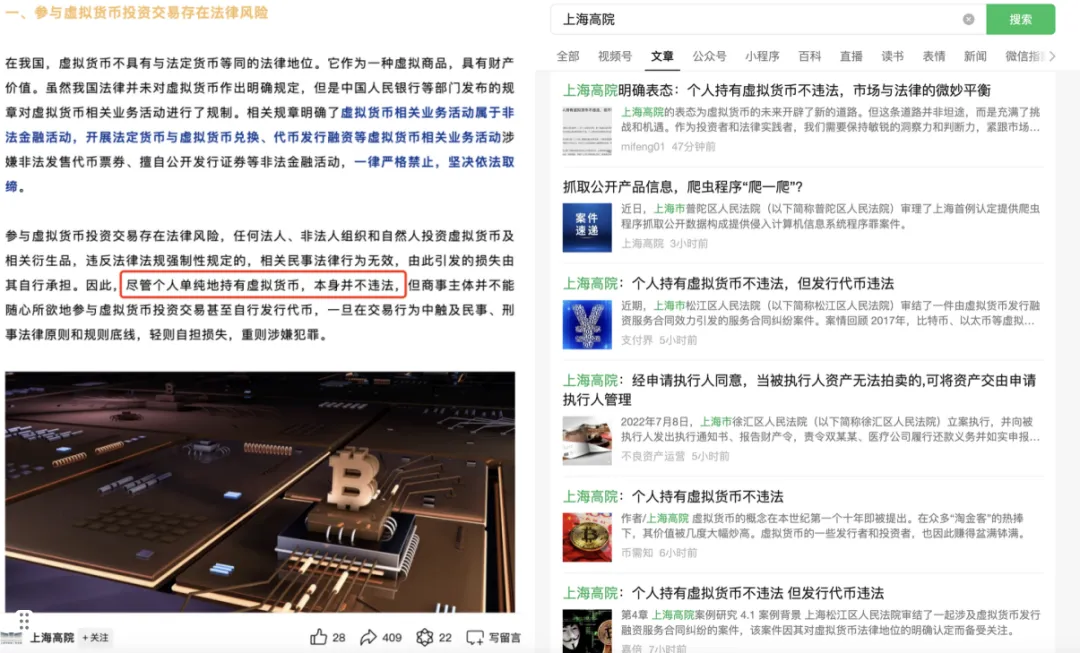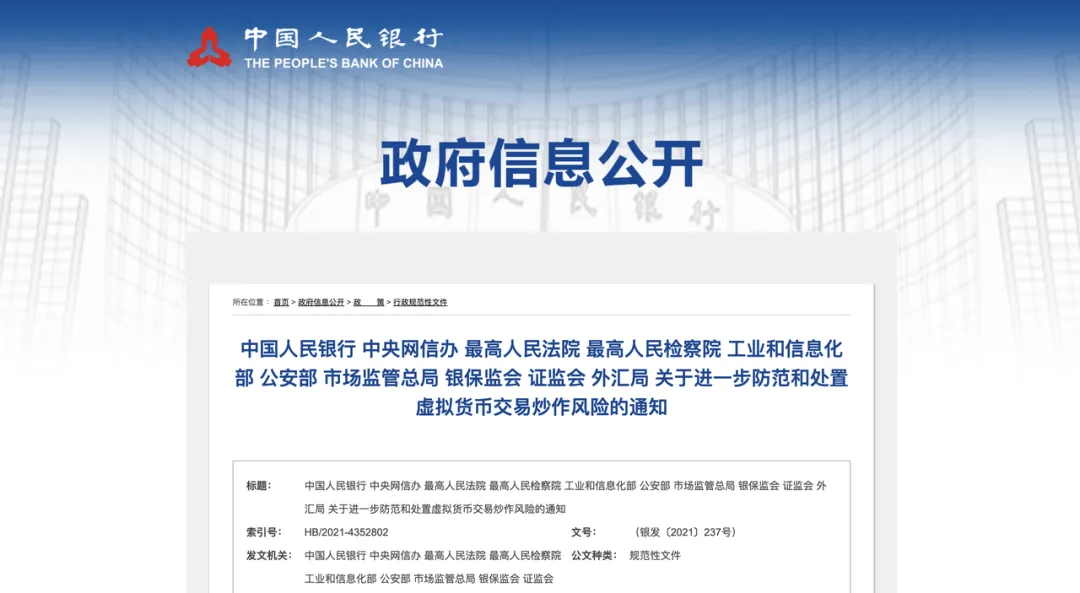In the past week, many friends around Lawyer Mankun have been discussing one thing: the Shanghai High Court published an article titled “What is the end of high financing for issuing virtual currencies?”, in which the author clearly states that holding virtual currencies is not illegal.

*Image source: WeChat article screenshot
Once this article was published, the domestic cryptocurrency community seemed to be celebrating, with various self-media outlets writing articles to promote this positive news, as if the publication represented a relaxation of restrictions on virtual assets in our country. Here, Lawyer Mankun must "pour a few buckets of cold water" on everyone, slightly dampening the enthusiasm for virtual asset investment and awakening rationality.
First Bucket of Cold Water: Holding Has Never Been Illegal
If we carefully review our country's policy documents regarding virtual currencies, we will find that for a long time, holding virtual currencies has not been illegal.
The current characterization of many illegal activities related to virtual currencies originates from the "924 Notice" issued in 2021. In this document, the People's Bank of China and ten other ministries clearly stated: virtual currencies do not have the legal status of legal tender and are not legally enforceable; activities related to virtual currencies are considered illegal financial activities, including providing trading services, exchange services, and issuing virtual currencies. However, this document does not mention the illegality of "individuals holding virtual currencies" at all.

In other words, holding virtual currencies is currently in a legally gray area. The article from the Shanghai High Court actually just reiterates this point and does not represent a relaxation of policy.
Although the law does not explicitly prohibit individuals from holding virtual currencies, their legality has not been fully recognized. However, in some cases, virtual currencies have been regarded as a type of virtual property. For example, in 2019, the Hangzhou Internet Court determined that Bitcoin has property attributes and meets the legal characteristics of virtual property, ultimately ruling in favor of the plaintiff's request for the defendant to return illegally transferred Bitcoin; again, in 2021, the Nanshan District Court in Shenzhen pointed out in a case involving Litecoin (LTC) that although virtual currencies do not have the status of legal tender, they can be regarded as virtual property in specific contexts, ruling in favor of the plaintiff's request for return.
As a type of virtual property, virtual assets are similar to QQ coins or rare game items, and holding them is certainly not illegal.
Second Bucket of Cold Water: Holding is Premised on Acquisition
However, many people overlook a key issue: the basis for holding is "acquisition." Currently, there are many ways to acquire virtual assets. Although most acquisition methods are not directly illegal, certain situations may pose legal risks due to operational methods or sources of funds. Below are the main acquisition methods listed by Lawyer Mankun for everyone's understanding:
1. Self-Purchase
Buying virtual currencies is one of the most common ways to acquire virtual assets. From a legal perspective, according to the "924 Notice", virtual currencies do not have legal enforceability and are not protected by law, but the document does not explicitly state that "purchase behavior" is illegal. Therefore, individuals purchasing virtual currencies on their own is not illegal under current law. However, it is important to note that trading activities involving virtual currencies are not protected by law, which means that once a transaction results in a financial loss, it is extremely difficult for individuals to seek legal recourse, and they may not receive legal support.
Additionally, the "legality" of the purchase behavior also depends on the compliance of the specific trading methods and sources of funds. For example, purchasing coins through overseas exchanges, while not illegal in itself, may involve issues related to foreign exchange management and tax declaration; while acquiring virtual currencies through over-the-counter (OTC) trading may pose higher compliance risks due to anonymity and lack of third-party protection. Especially in OTC trading, information asymmetry can easily lead to fraud or financial loss.
At the same time, a common illegal situation in virtual asset trading in our country is the unclear source of trading funds, which may even involve "dirty money." If a buyer unknowingly purchases virtual currencies suspected of being illegal, even if the purchase itself is not illegal, they may face account freezing issues due to indirect participation in illegal fund flows.
2. Participating in Mining
Acquiring virtual currencies through mining was once one of the main methods for investors, especially during the Bitcoin and Filecoin boom. However, with changes in policy, the legality of mining has gradually become complicated.
From a policy perspective, the "Notice on Rectifying Virtual Currency 'Mining' Activities" issued in 2021 clearly lists mining as an industry to be eliminated and requires a comprehensive cleanup of new mining projects and acceleration of the exit of existing projects. This means that large-scale mining activities have been explicitly restricted by national policy. If mining activities lead to high energy consumption or environmental damage, or even involve illegal electricity use, they may be deemed invalid for violating public order and good customs or green principles. For example, in a contract dispute case between a company in Shanghai and a company in Beijing, the court ruled that mining activities, due to high energy consumption and high risk, which are not conducive to the country's green development goals, rendered the relevant contract invalid.
So, is personal mining considered illegal? Currently, there are no direct legal prohibitions against small-scale personal mining in our country. Theoretically, individuals can purchase mining machines through legal means and use their own electricity resources for mining without violating current laws. However, in practice, some mining activities may touch the legal bottom line due to illegal means or improper operations. For example:
· Illegal electricity use. Some miners steal electricity resources for mining, such as by modifying electricity meters to reduce recorded usage or directly connecting to illegal power grids. These actions not only constitute civil infringement but may also involve theft.
· Illegal use of others' computing resources. Controlling others' computers for mining through malicious programs may constitute the crime of damaging computer information systems, which is a criminal offense.
· Financial compliance risks. If the virtual currencies obtained from mining involve illegal transactions or fund flows, such as money laundering or tax evasion, miners may be held legally responsible.
3. Participating in Investments
Acquiring virtual currencies through investment projects is another common method, especially in the early blockchain industry, where ICOs (Initial Coin Offerings) were once all the rage. However, the "legality" of this method varies depending on the specific operational model and carries high potential legal risks.
First, from a legal perspective, ICOs are clearly illegal financial activities in China. As early as the "94 Document" (Announcement on Preventing Risks of Token Issuance Financing) issued in 2017, the People's Bank of China and seven other ministries explicitly prohibited fundraising through ICOs and required the cleanup of existing projects. ICOs are regarded as unauthorized fundraising activities, suspected of illegal fundraising and illegal issuance of securities. Investors participating in such fundraising activities may suffer economic losses if the project party absconds.
Unlike ICOs, in recent years, participating as a VC in investments to acquire project tokens has gradually become a popular financing model. Investors inject funds directly into blockchain projects to receive tokens distributed by the project party as a return. Although this method seems to avoid the compliance risks of ICOs, its legal pitfalls should not be overlooked:
· First, the projects in which VCs participate may involve compliance issues, such as if the invested project is suspected of illegal issuance of securities.
· Second, the transparency and legality of token distribution are equally important. If the tokens obtained through VC investment do not have clearly defined purposes or rights, disputes may arise. For example, some projects attract funding through inflated token valuations, but when the project stagnates or operates poorly later, investors' rights may be harmed.
4. Participating in Activities
Acquiring virtual currencies through participation in activities organized by project parties, such as airdrops and referral rewards, may seem like the lowest-cost and simplest method, but it may hide many legal and compliance risks.
From a legal perspective, airdrops are not illegal in themselves, especially when users do not pay consideration or commit to specific obligations. However, many projects use airdrops as a cover, with the actual goal of expanding influence and attracting users to participate in subsequent illegal activities. For example, some projects guide users to download DApps through "airdrop tokens," ultimately using these platforms for false transactions, money laundering, or other illegal activities.
Referral rewards are another common activity model, especially in projects that need to rapidly expand their user base. These activities typically use the number of referrals or transaction amounts as reward criteria, attracting users to continuously bring in new participants. However, models that reach three levels or more in rebate tiers are easily recognized as pyramid schemes. If a project uses the number of directly or indirectly developed personnel as a reward basis, it may be suspected of being illegal, and participants may bear legal responsibility as a result.
Additionally, some activities lure users to recharge or invest by promising high returns. Such behaviors often use "the more referrals, the more rewards" as a guise, but lack any actual value support, constituting a typical Ponzi scheme. In this case, whether participating in promotion or inadvertently getting involved, one may become embroiled in legal disputes.
Lawyer Mankun's Recommendations
· Compliance first, choose reasonable channels
Investors should ensure the legality of trading methods and sources of funds when purchasing, mining, or participating in activities, avoiding cooperation with projects or funds of unclear origin. Choose reputable platforms and projects, and keep transaction records to reduce legal risks.
· Stay away from illegal activities, avoid high-risk projects
Avoid participating in clearly prohibited ICOs and other illegal fundraising activities or high-return referral rewards and pyramid schemes, and be wary of Ponzi schemes, ensuring that investment behaviors comply with legal requirements.
· Seek professional legal support
For complex legal issues related to virtual currencies, such as cross-border transactions, tax compliance, and asset protection, consult professional lawyers in a timely manner to ensure that your rights are protected.
The development of virtual currencies is full of opportunities but also accompanied by risks. As investors, it is essential to remain sensitive to laws and regulations, exercise caution in operations, and invest rationally, seeking a balance between innovation and compliance.
免责声明:本文章仅代表作者个人观点,不代表本平台的立场和观点。本文章仅供信息分享,不构成对任何人的任何投资建议。用户与作者之间的任何争议,与本平台无关。如网页中刊载的文章或图片涉及侵权,请提供相关的权利证明和身份证明发送邮件到support@aicoin.com,本平台相关工作人员将会进行核查。



